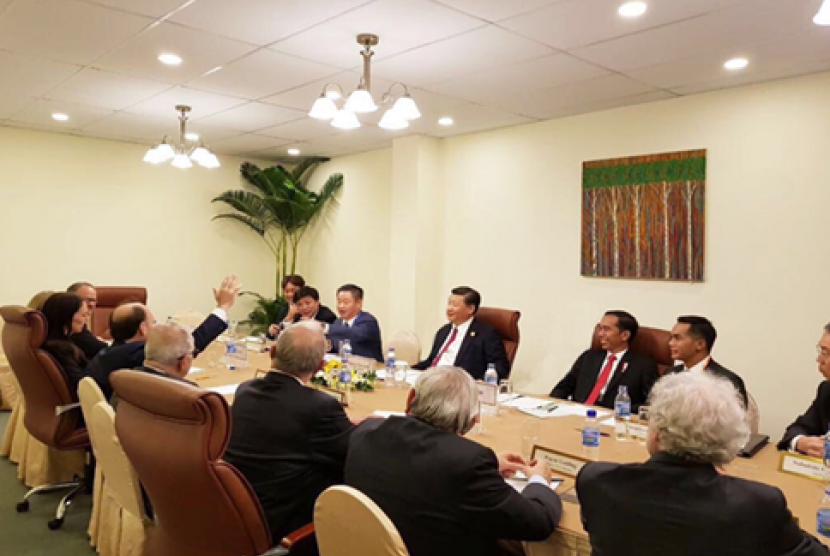REPUBLIKA.CO.ID, The Indonesian government (Republic of Indonesia/RI) once again brought forth the issue of the importance of economic development role models for alleviating disparity, as a continuation of the forum discussion of APEC Business Advisory Council (ABAC) Dialogue with APEC Leaders during the 25thAPEC Summit in Da Nang, Vietnam. The said issue was reaffirmed by Indonesian ABAC Chairman Anindya Novian Bakrie after being a speaker in theNational Media Convention on National Press Day at Padang, West Sumatra, 8 February 2018.
According to Anin, President Jokowi put forward the issue of economic empowerment in every region as one of the ways to overcome such disparity.
“President Joko Widodo continues to fight for disparity issue during the international diplomacy that involved 21 APEC nation leaders, seeing that economic disparity is happening everywhere, not just in developing but also in developed nations. Indonesia deserves to be a role model based on our achievements in the last 3 years,” explained Anin.
Thus far, both ASEAN and APEC members have experienced a rapid growth in trade and investment, but issues on economic disparity are still happening in those nations.
Other than that, equilibrium that is needed in order for equitable economy to be created; are as follow:
First, village funding programs and village funding institutional reinforcement. The government has not only distributed village funding in the value of Rp800 million per village, they have also empowered the fund as cash for work, knowing that a village is the smallest entity driving the nation’s economy. In 2017, the total of village funding has reached Rp60 trillion.
Second, Micro, Small and Medium Enterprise programs. The government has provided Credit for Businesses (Kredit Usaha Rakyat/KUR) to Micro, Small and Medium Enterprises to reduce the number of economic disparity. The ceiling of Credit for Businesses (KUR) for Micro, Small and Medium Enterprises in 2017 is set at Rp106.2 trillion.
Third, the digital economy program. The Indonesian government sees that the digital economy has not only created an innovative growth but has also had a disruptive impact on an already established condition.
Previously, the President of the United States of America, Donald Trump, in its speech during the APEC Summit in Da Nang conveyed his appreciation for Indonesia for its ability in alleviating disparity, making it the nation with the fastest growth in G-20.
Aside from disparity issue, President Joko Widodo also brought fourth the issue of Maritime Economy, where going forward, it must be one of the sectors that is relied upon in the development of the ASEAN nations.
“Just as during the APEC Summit in Da Nang, Vietnam recently, President JokoWidodo sees that the Indonesian waters have become one of the most important economic sectors. Furthermore, 7 ASEAN nations are members of APEC. So this suggestion can be the role model during the 31st ASEAN SUMMIT in Manila, Philippines,” said Anindya.
A few bases of President JokoWidodo’s thinking have become the main vision of ABAC Indonesia’s fight in the post-2020 APEC, in order for the equilibrium between the economic growth and justice to be created for all nations in Asia Pacific, as was fundamentally agreed upon during the 1994 APEC Bogor Goals.
Anindya Bakrie as the chairman of ABAC Indonesia that accompanied President Joko Widodo during the APEC Summit in Da Nang, took part in formulating a few discussions that became major issues for Indonesia.
APEC was established in 1989, and this year has entered the finalization phase of the “Bogor Goals” regarding the trade and investment liberation in 2020, where Indonesia’s continued contribution is expected.


